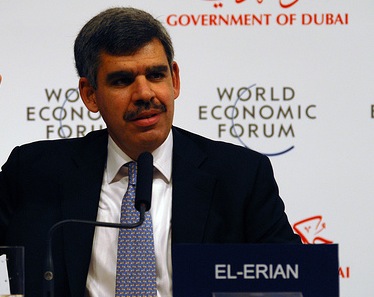Egyptian Americans Celebrate The Egyptian Revolution And Mohamed El-Erian

There’s a persistent hum of excitement at the reception for the Egyptian American Organization’s “Outstanding Achievement” awards ceremony at UCLA on Sunday. The honoree is Mohamed El-Erian, the CEO of PIMCO, the world’s largest bond investor, and author of the New York Times bestseller When Markets Collide. He’s also been the go-to economics guy for the likes of Charlie Rose and CNBC.
But today, the words on everybody’s lips is not the name of the event’s accomplished awardee-- instead, the words “protests”, “democracy” and “revolution” puncture all the conversations. There’s a sense of bewilderment that accompanies the words but, most of all, joy.
“It feels very festive today,” Nancy Soliman says to her sister, Nellie, from across the table. The Solimans were raised in the United States, but no Egyptian is excluded from the feelings of pride and happiness that resulted from watching the events of the last two weeks unfold on their televisions. For Nancy and Nellie, who have family in Egypt, they’ve also been experiencing the Egyptian Revolution through the phone.
“In the beginning, they were a little scared and apprehensive,” said Nellie, who kept in touch with her cousins in Egypt, “and then after a while, they starting getting more pumped up, pumped up, pumped up.... Now they’re just ecstatic, they’re over the moon.”
The pride in Nellie’s voice is evident. Pride, this afternoon, is not only atmospheric but a point of conversation. As the string players and drummer in one corner of the room began to play the music to the Egyptian national anthem, Nellie and Nancy’s mother suddenly stands up, loudly urging others to follow her lead.
Suddenly, people are singing the Arabic words to the Egyptian national anthem-- “ya beladi,” they sing, some with tears in their eyes, another as he waves an Egyptian flag that seemingly came out of nowhere, “my country”.
Faiza Shereen, a chair of the EAO, is the emcee today and before El-Erian takes the stage she calls for a moment of silence for those who’ve died in the 18 days of protest.
“With sorrow, we mourn their lives,” she said to a room that, up until now, has been buzzing with excitement but is now solemnly silent, “With pride, we celebrate their souls.”
El-Erian’s speech for this afternoon is titled “Navigating Change in Today’s World” but El-Erian puts his notes away. He’s not going to speak about economics today. Today is about Egypt and no one seems disappointed in the change in program.
“In 1967, our national pride gave way to shock,” said El-Erian in his speech, referring to Egypt’s loss of the Sinai Peninsula to Israel in the Six Day War, “I as a kid left [Egypt] in 1968 as my father was posted to New York, and I never thought that I would ever feel again the intense feeling of Egyptian pride. But I have felt it in the last two weeks.”
El-Erian’s speech is frequently interrupted by exuberant cheers and applause. The audience can’t contain themselves. Some yell out unintelligibly and one person on the left side of the room claps loudly even when no one else is clapping. Smiles are a dime a dozen. But as El-Erian speaks about the future of Egypt, they listen quietly and attentively.
El-Erian said in his speech that Egypt’s economy has experienced a “sudden stop”, which occurs during wars or natural disasters. But he’s optimistic.
“It’s about restarting the economy... and in the right way,” he said.
In an interview with Neon Tommy, El-Erian doesn’t express any worries about Egypt’s political future.
“I see Egypt firmly on the road to democracy, to greater individual freedom,” he said. “It’s important to get a few things right. The transition period is going to be very important. We’ve got to get the economy back on track and we’ve got to build stronger institutions. I’m very excited about Egypt’s future.”
Shereen, who is “euphoric” about Egypt’s revolution, shares a similar sentiment. She sees Egypt on the road to democracy but, as a professor at Cal Poly Pomona, she wants to see reform in education.
“We have fallen behind in Egypt because lack of funding,” she said of the educational system.
Like the Soliman’s, Shereen has kept up with the revolution by keeping in touch with relatives who were in the middle of it.
“One of my older relatives, in her 80s,” she said, “ [she] had her kitchen working 24 hours a day to make sandwiches for those out in the streets. So even old people who couldn’t go out and participate were participating.”
Shereen announced an impromptu forum on the Egyptian revolution to take place right after the awards ceremony. El-Arian was joined by Dr. Mahmoud Bayar and Dr. Mohammed Ibrahim. Bayar, though joyous, was wary of Egypt’s future.
“To succeed together is not the most difficult thing, the most important thing is to stay together,” he said, “...It is not in the DNA of the military to give up power. It is not in the DNA of dictators to give what they have and deliver it to others. Freedom and liberty have to be pried out of their fingers. And that is going to take a lot of blood, sweat, and in the words of Churchill, tears.”
Reach reporter Tasbeeh Herwees here.
Sign up for our weekly e-mail newsletter.



